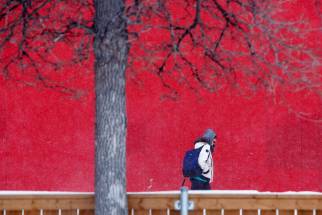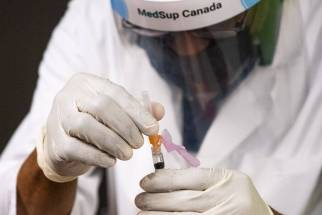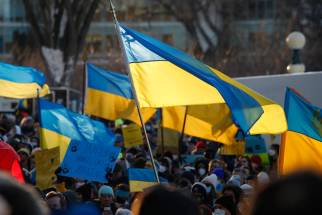Ukraine dominates talk at Manitoba legislature
Read this article for free:
or
Already have an account? Log in here »
To continue reading, please subscribe:
Monthly Digital Subscription
$0 for the first 4 weeks*
- Enjoy unlimited reading on winnipegfreepress.com
- Read the E-Edition, our digital replica newspaper
- Access News Break, our award-winning app
- Play interactive puzzles
*No charge for 4 weeks then price increases to the regular rate of $19.00 plus GST every four weeks. Offer available to new and qualified returning subscribers only. Cancel any time.
Monthly Digital Subscription
$4.75/week*
- Enjoy unlimited reading on winnipegfreepress.com
- Read the E-Edition, our digital replica newspaper
- Access News Break, our award-winning app
- Play interactive puzzles
*Billed as $19 plus GST every four weeks. Cancel any time.
To continue reading, please subscribe:
Add Free Press access to your Brandon Sun subscription for only an additional
$1 for the first 4 weeks*
*Your next subscription payment will increase by $1.00 and you will be charged $16.99 plus GST for four weeks. After four weeks, your payment will increase to $23.99 plus GST every four weeks.
Read unlimited articles for free today:
or
Already have an account? Log in here »
Hey there, time traveller!
This article was published 02/03/2022 (1377 days ago), so information in it may no longer be current.
The spring session of the Manitoba legislature officially began Wednesday with the introduction of two new bills — but the spectre of the Russian invasion of Ukraine was front and centre.
Members of the legislative assembly were united against a common enemy and in support of democracy, but divided on how best to show it.
“Manitoba stands with the people of Ukraine,” Premier Heather Stefanson told the house.
She condemned Russian President Vladimir Putin’s “heinous attack” on Ukraine and said it’s not the first time Ukrainians have suffered under an “evil” dictatorship. The premier noted the monument on the grounds of the legislature to the victims of the Holodomor, the man-made famine and genocide in Ukraine engineered by Russian dictator Joseph Stalin in the 1930s.
Manitobans are united with Ukrainians to “make sure that never happens again,” she said.
The government has pledged $150,000 in humanitarian aid for Ukraine and is working to expedite more than 100 immigration applicants to Manitoba’s provincial nominee program. It also pledged to work with the federal government to welcome refugees who’ve fled Ukraine.
That’s not enough, critics say.
“We know we have to do more,” said NDP Leader Wab Kinew, who called on members “to unite against a common enemy — that enemy is Vladimir Putin.”
Manitoba should be bringing in thousands of Ukrainian immigrants and refugees and providing them with support and settlement services, he told the house. The province should waive the $500 application fee for nominee program applicants from Ukraine, a country where many Manitobans have roots, Kinew said.
There were 18 Ukrainian applicant files in the nominee program system recently, and all were prioritized, completed and sent to Immigration, Refugees and Citizenship Canada for permanent residency approval, according to the press secretary for Immigration Minister Jon Reyes.
Those were in addition to 36 Ukrainian applicant files previously sent, said Brant Batters, who could not provide specific dates late Wednesday.
Both Kinew and Liberal Leader Dougald Lamont called for the premier to match Manitobans’ donations toward humanitarian aid for Ukraine, and to make sure the province is supporting economic sanctions and not harbouring any business dealings of Russian entities supporting Putin.
“We know there’s a need to take steps to lift the veil of secrecy which helps to protect business interests of some of the oligarchs who enable Vladimir Putin,” Kinew told reporters in a scrum outside the legislative chamber.
“Manitoba’s business registry is a black box,” Lamont said, adding there are a few Russian oligarchs with assets in Manitoba. He called on the provincial government to create a transparent, searchable public registry that could identify them.
“It’s the only way we’ll be able to identify assets and freeze them to put more pressure on Russia and help Ukraine,” Lamont said.
However, Manitoba already has “some of the most complete legislation in the country,” the premier’s press secretary, Olivia Billson, said Tuesday.
The 2019 Business Registration, Supervision and Ownership Transparency Act requires companies registered in Manitoba to track people who have 25 per cent or more interest in voting shares, including those outside the province and offshore.
“We can also confirm that the government of Manitoba’s borrowing and investment activities in no way involve Russia,” she said.
Two government bills were introduced Wednesday.
Bill 11 (Elections Amendment Act) authorizes the use of vote-counting machines and removes the requirement a candidate’s residential address be published.
Bill 10 contains two legislative amendments: one would allow pharmacists to continue to conduct COVID-19 tests, the other allows for virtual meetings of co-op and condo owners, corporate directors and shareholders to continue post-pandemic.
carol.sanders@freepress.mb.ca

Our newsroom depends on a growing audience of readers to power our journalism. If you are not a paid reader, please consider becoming a subscriber.
Our newsroom depends on its audience of readers to power our journalism. Thank you for your support.













